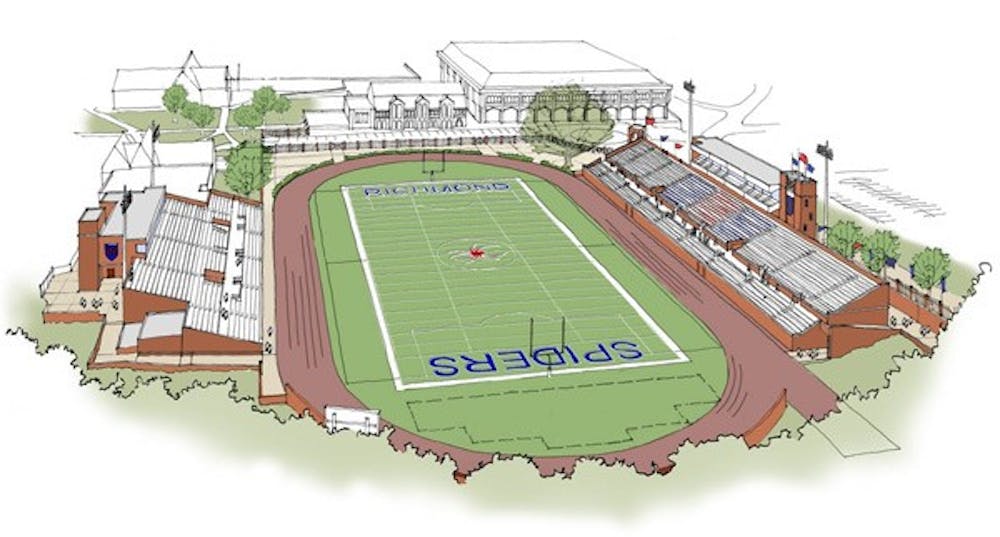The Richmond City Council has voted unanimously to grant a permit required for the university to begin construction of a new on-campus football stadium.
The council approved Richmond's request for a special use permit at a July 28 public hearing, the final political barrier to expanding and renovating First Market Stadium.
As part of the permit approval, the university will pay for road construction to connect Crenshaw Way and Spider Lane. From UR Drive, a right turn lane onto River Road will be added along with a sign posted at the entrance. Other alterations will be necessary to streamline game day traffic into campus, improvements which are set to be completed by Sept. 1, 2010.
The city requires that new structures cannot "create congestion in streets, roads, alleys and other public ways in the area involved," a concern once shared by many of the university's neighbors. The road changes were proposed to address the problem.
"Traffic, Traffic, Traffic," said Bruce W. Tyler, the city councilman who represents Richmond's West End District I. "Residents were concerned about the congestion that would result with 8,700 people attending the games."
The stadium is still projected to open for the 2010 football season, but it's unclear when construction will begin. University officials say ground-breaking could start in six months because additional design and planning must be completed on the 8,700-seat stadium, which is expected to take 18 months to build.
Tyler applauded the university and President Edward Ayers for working to address neighbors' concerns and work with the city.
"When this process began there were two parties diametrically opposed to each other," Tyler said. "There was not a lot of communication going on. The whole situation has changed now."
Ayers also expressed his approval of the stadium project's outcome.
"Nobody in any of the communities objected to the project, they just wanted to know that we were aware of, and preparing for what it would mean for the communities," Ayers said. "It's hard to imagine that we have gone for so long without [a stadium]. This will be something that will transform Richmond."
Spiders wide receiver Kevin Grayson, who last year set a single-season school record with 68 receptions, said that when he first arrived at Richmond, he was upset about having to travel to home games.
"It was just something I had to get used to," he said. "Having the stadium on campus will definitely help the program. Students won't have to worry about transportation to and from the games, and they wont leave early because they can walk to and from the games."
Enjoy what you're reading?
Signup for our newsletter
Grayson said that having cheering students at the games helps players perform well on the field.
"When you make a big play, and the crowd is yelling ... it gets you ready to make another big play, and it starts to bring the visiting team down," said Grayson, who will be a senior when the stadium opens.
Matt Whittaker, president of the Richmond College Student Government Association, attended the July 28 city council meeting and said many players, students and administrators turned out to show support.
"Councilman Tyler asked the crowd, 'Who all is here in support of University of Richmond's stadium?'" Whittaker said. "The whole room stood up, including community members. It was really a testament to how well handled the project has been."
School officials and student leaders have expressed hope that the new stadium will bolster school spirit and boost game attendance. Despite the football team's best performance in post-season school history last year, attendance was low at games in 2007.
"I think it's going fundamentally change to the university," said John McCulla, the university's director of community relations. "The stadium will give students, faculty and alumni a place to come together, as well as giving residents from the surrounding neighborhoods a chance to come and be a part of our community."
Whittaker said that he thought the stadium would revolutionize student involvement in football.
"Think of having the games on campus and all the activities that will be going on -- the tailgating and parties -- it's going to be awesome," he said. "Having a small stadium that we can fill and be loud, it will make all the difference."
An expanded stadium will not only give a jolt to school spirit, but it will also boost the Spider football program by making it one of the best facilities in the Atlantic 10 conference, head coach Mike London said.
"Having an on campus venue is key to any program's success," London said. "There is no doubt the new stadium will attract good players. We want to be known as having the best because we know that the academic reputation that Richmond has is second to none"
Support independent student media
You can make a tax-deductible donation by clicking the button below, which takes you to our secure PayPal account. The page is set up to receive contributions in whatever amount you designate. We look forward to using the money we raise to further our mission of providing honest and accurate information to students, faculty, staff, alumni and others in the general public.
Donate Now



